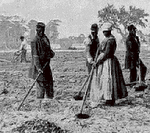The idea of being enslaved day in and day out seems like it would be torturous enough, but slaveholders made life even worse for their “property.” Slaves in the U.S. were brutally beaten, subject to terrible conditions, and generally not given what are viewed as the basic rights of human life. The preamble of the United States Declaration of Independence states, "We hold these truths to be self-evident, that all men are created equal, that they are endowed, by their Creator, with certain unalienable Rights, that among these are Life, Liberty, and the pursuit of Happiness." Here all men are created equal, yet slavery is permissible and terrible treatment of slaves is as well. Of course the fault with this argument is the definition of who qualifies as a man in 1776 America, which is naturally only landed white men. At this point in history to be a woman or to be non-white meant that the Declaration of Independence did not apply, and neither did the inalienable rights of humanity.
Since the slaves did not qualify as “man” at this point in time they were subject to brutality of different forms. In his narrative, Douglass refers to the rape and beating of his Aunt Hester. The scene Douglass describes includes not only whipping but also reveals the sexual relationship between Hester and her overseer: “Before he commenced whipping Aunt Hester, he took her into the kitchen, and stripped her from neck to waist, leaving her neck, shoulders, and back, entirely naked” (Douglass 52). Hester was punished for having a relationship with another slave instead of being the concubine of only Mr. Plummer. Women slaves were almost always abused sexually by their masters and overseers; this was a fact of life to these women as they had no means of escaping this sexual assault.
In addition to beatings for punishment and rape of women, slaves were forced to live in terrible conditions with barely the necessities to survive. Douglass describes the living conditions of the slaves in detail on pages 54 and 55. The bed they all shared was “the cold, damp floor” sharing few, coarse blankets. Additionally, clothing allowances were two linen shirts, one pair of linen trousers, one jacket, one pair of winter trousers, and one pair of shoes. For children the clothing was even less; those unable to work in the fields were given only two shirts per year with nothing else. The food was meager, sleep time was barely enough to get fully rested, and there was definitely no time for leisure activities. Life as a slave was a repetitive and cruel existence. It seems hard to believe today that this sort of treatment was allowed in a country that prides itself on freedom and liberties for all men.
In my previous post I discussed that slavery was acceptable because of the supposed ignorance of the slaves, the curse put upon them by Noah, and the idea that they could not survive without the help of their white owners. The inability to gain knowledge was perpetuated by the lack of free time or resources available to the slaves to better themselves intellectually. True, this was the intention of the slave holders as “learning would spoil the best nigger in the world” (Douglass 78). The slaves were treated unfairly on so many levels it is hard to imagine putting up with that lifestyle and not choosing to take one’s own life instead. Intellectual suppression, rape, physical abuse, hellish living conditions- in some ways it is hard not to admire the slaves for their diligence in putting up with the ridiculous treatment they received. On a final note, the lives of slaves illustrate that life without liberty is no life at all.
Portrait of Frederick Douglass
Frederick Douglass
A Photo Documentary of Slavery
Subscribe to:
Post Comments (Atom)

2 comments:
"In my previous post I discussed that slavery was acceptable because of the supposed ignorance of the slaves, the curse put upon them by Noah, and the idea that they could not survive without the help of their white owners."
Was it acceptable for these reasons, or merely thought acceptable for these reasons? And to whom was it acceptable, and what do you think of this argument?
I believe that to the slaveholding Christians, they were disillusioned into actually finding slavery acceptable for these reasons. It is my opinion that slaveholders actually thought what they were doing was just. I don't think that it is normal human behavior to act as a group in what we believe are immoral actions. These people were taught by their society and times that slavery was OK and that colored people were not worthy of the same rights as those with light skin. As for those that did see the problem with slavery, most of them were still not comfortable with the idea of blacks living in their neighborhoods or working along side them. If slavery was not correct, then where were these people to go if not to white cities and neighborhoods?
Post a Comment